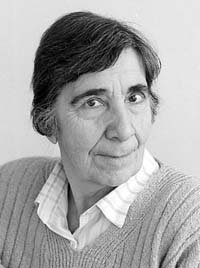A Moment in the Life of a Genius

In the mid-1830s, Nikolai Gogol (Mykola Hohol) arrived in Paris, leaving behind in Petersburg many problems, such as conflicts with censors and publishers. What badgered him the most was the fact that The Inspector-General’s premiere raised loud outcries among critics and audiences alike (“All the estates are up in arms against me”).
In Paris, Gogol met his fellow countryman Bogdan Zaleski, a Polish man of letters, who introduced him to the famous Polish poet Adam Mickiewicz, a political ОmigrО at the time. Adam Mickiewicz made a lasting impression on Gogol. They found they had so many common features; they talked at length over not only literary but also political issues, which Gogol always shunned in Russia.
Grigory Danilevsky, a friend of Gogol’s who was with him in Paris, said about the meeting of the two great poets, “The reason why Gogol spent a long time in Paris was his high appreciation of the work of Adam Mickiewicz and the Ukrainian poet Zaleski. As Gogol could not speak Polish, they conversed in Russian or, more often, Little Russian. Among other things, they talked about Muscovites, whom both the Poles and Gogol took a dim view of.” (This happened shortly after the brutal suppression of the first Polish uprising, when all the Polish “liberties,” such as the Constitution of 1815, the Sejm, and the Polish army, were canceled).
Zaleski wrote in his letters, “We kept discussing the origins of the Russian language and culture. Gogol believed that the Great Russians notably differed in the spirit, customs and morals from the other Slav peoples, which shows that the former have Asian roots. To prove this viewpoint, he did what may be called a brilliant off-hand case study, in which he compared — citing concrete examples — the songs of various Slav peoples (Czech, Serbian, Ukrainian, etc.) with those of Muscovites. When expressing a certain feeling, Ukrainian songs, for example, sound ‘sweet and tender,’ while Russian ones seem to be somber, wild and sometimes even ‘threatening or sinister’ in comparison.” Gogol thought this difference could be explained by the fact that the Russians were not related to the Ukrainians and other Slavs.
It so happened that this small essay of Gogol’s not only was never printed but vanished completely from his posthumous archives. Maybe it was destroyed by the author himself, a loyal subject of the Russia Empire, or by the editors who did not wish to “blemish” the good name of the great Russian writer.
It would be wrong, however, to call this episode into question, taking into account that Gogol, for example, loved Ukrainian (“Little Russian”) songs which he collected and recorded at every opportunity. The three surviving notebooks of his contain about 500 songs. He also held in high esteem his friend Mykhailo Maksymovych who had published some collections of “Little Russian songs.” Gogol sent him his own findings to be printed and could not resist the temptation of writing the text of some new song in his letters. For, although Gogol was completely Russified and often publicly dissociated himself from the Ukrainian movement, he still remained a son of Poltava. This is how he congratulated Maksymovych on publishing a new collection of songs, “I am holding your first sheet, full of joy like a child, and say, ‘Here is what has remained of erstwhile thoughts and years!’” In another letter to Maksymovych, Gogol discussed plans of joint work in the just-opened Kyiv University, “On we go! To Kyiv! To the old and beautiful Kyiv! It is ours, not theirs, isn’t it? Our remote history was in the making in or around it... We can do so much good and revive ourselves there. Good by, I’ll be looking forward to the songbook you promised, the more so that I keep receiving new ones, most of which are not just historical but beautiful.” In the article “On Little Russian Songs,” Gogol sadly writes, “In Little Russia, songs are everything — poetry, history, and the parental grave... They are all-pervading, they breathe with the unrestrained Cossack spirit... All songs are extremely mellow, touching, and multifaceted.”
After a sojourn in Paris and friendly chats with the rebellious Poles, Gogol went to Rome. He had run up debts and was in a financial quandary, which could upset his plans to stay abroad for a longer time — perhaps forever. But things went differently. At the time, Grand Prince Alexander (future Tsar Alexander II) was in Rome, accompanied by his mentor Vasiliy Zhukovsky, also an old friend and influential protector of Gogol’s. According to Polish sources, Zhukovsky arranged for Gogol to meet the young grand prince who received the writer very goodheartedly and promised, among other things, to pay his debts. So when Bogdan Zaleski soon met Gogol again, he found a person entirely different to the one who compared Russian and Slavic songs in Paris. In this connection, the Polish writer recalled the “historic” rendezvous of Aleksandr Pushkin and Tsar Nicholas I, which had a serious impact on the Russian poet’s further creative life.
Mikhail Pogodin wrote after Gogol’s death, “He was an extraordinary personality, but death made him even more mysterious and hard to understand than he was in his lifetime. He should not be measured or judged by the common yardstick, and we must not even try to do so... What was part of his psyche and what was part of his ethnicity, upbringing, and life experience? What did he acquire by birth and what emerged in him involuntarily is impossible to understand or embrace.”






